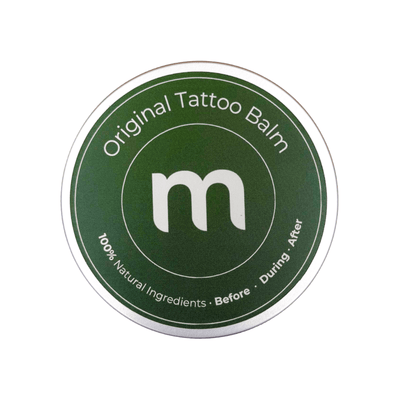Whether it's a reminder of an important milestone or memory in life, or simply an expression of one's own personality and style, tattoos have become increasingly popular with people from all walks of life. But why is it that tattoos are permanent?

In this blog post, we will explore the science behind how tattoos work and why they cannot be removed or changed easily. We will discuss what happens when ink is injected into the skin and the techniques used by tattoo artists that make them difficult to remove.
By understanding these processes better, we can gain a greater appreciation for why tattoos are so special — because once you get one, it lasts forever!
How do Tattoos Work?
When most people think of the tattooing process, they often imagine that ink is injected into the skin and is magically held in place. However, in reality, there is much more to it than just that. Tattooing is an art form that requires skill and precision in order to create lasting results.
When you get a tattoo, sharp needles are used to quickly and repeatedly penetrate the epidermis (the outermost layer of skin). Each tattoo needle then deposits ink particles beneath this thin outer layer into something known as the dermis. This is the layer of your skin that contains collagen fibres, blood vessels, and nerve endings.

Cell death and regeneration is a continuous process, so tattoo ink that has only been deposited in the outer layer of the epidermis will eventually be shed away due to the natural turnover of skin cells. Therefore, if the tattoo ink does not reach the deeper dermis layer, the tattoo is likely to disappear within just a few weeks.
However, when the needle penetrates deep enough and reaches the dermis, this creates a much more permanent result. The body's immune system is launched into action during the tattooing process due to the trauma inflicted on the skin by the needles.
Specialised phagocytic immune cells migrate to this damaged area and try to remove as much of the foreign material (the tattoo ink) as possible. These macrophages (one of the four types of phagocytic cells) absorb the particles of ink as part of the body's immune response.
Some are taken back to the lymph nodes, where they can be excreted via the liver. However, not all the macrophages complete their journey, which means that not all the pigment particles are removed from the body. Instead, the leftover phagocytic cells, which have already engulfed the tattoo ink, stay in the dermis and remain visible.

What Happens to the Ink Particles When These Cells Die?
When macrophages containing tattoo ink die, the body’s immune system is unable to remove them. This is because the cells are no longer able to process and transport foreign particles to the lymph nodes.
As a result, all the ink particles are reabsorbed by the surrounding cells, which makes it difficult for any further attempts at removal or modification to take place without scarring or damage to the surrounding tissue.

This is why tattoos are so long-lasting and often require more invasive treatments such as laser therapy to remove them. It's also why tattoos can be difficult to modify.
The ink particles that make up your tattoo have become a permanent part of you, embedded in the deeper layers of your skin and held in place by the macrophages.
Techniques Used to Make Tattoos Permanent
The actual tattoo design itself can also play a major role in its permanence. The way that tattoo artists works with their modern tattoo machines, needles and ink, as well as how they layer colours and textures, all contribute to how long it will last without fading.
A good tattoo artist knows how to create designs that will last, and they use techniques such as shading, outlining, and dot work to ensure the ink remains in its correct place.
Does Tattoo Ink Fade?
While tattoos are still completely permanent and remain visible for a lifetime, they do naturally fade over time and lose their vibrancy. Sun exposure is one of the main factors that causes the ink particles to break down. Other factors include improper care and maintenance as well as the natural skin-shedding process that occurs as we age.
However, it's important to note that regular touch-ups can help keep a tattoo looking vibrant and fresh.
If Tattoos are Permanent, Can They be Removed or Altered?
Although tattoos are generally considered to be permanent given the reasons mentioned above, there are ways to alter or remove them.
Laser tattoo removal is perhaps the most effective method nowadays. During this procedure, a device emits pulses of laser light that target the tattoo ink, breaking it up into smaller particles. These particles are then absorbed by the body as waste and eventually fade away.

However, laser tattoo removal can be expensive, painful and time-consuming. In some cases, there will still be ink present post-treatment. Additionally, it may cause scarring or skin discolouration.
Another option is to cover up an existing tattoo with a new design. Many people choose this option because it can be much easier and less painful than laser tattoo removal. However, depending on the complexity of the design, it could take multiple sessions to achieve a satisfactory outcome.
So... Why do Tattoos Last Forever?
In conclusion, tattoos are permanent because they become embedded in the deeper layers of skin and held in place by macrophages. The ink particles that form a tattoo can’t be removed or changed easily without causing damage to the surrounding tissue. Tattoos may fade over time due to sun exposure and other factors, but touch-ups and proper aftercare can help maintain their vibrancy.
Laser tattoo removal is an option for those looking to remove a tattoo, although it can be expensive, painful and time-consuming. Covering up an existing design with a new one is another popular choice for those wanting to alter their current tattoos. Ultimately though, once you get your desired artwork etched into your skin - it's there forever!
In conclusion, tattoos are designed with permanence in mind and often require invasive treatments like laser therapy in order to be removed or altered. It's important to take your time and consider all options before getting a tattoo, as once it's done, it will be with you for life.
Last updated January 2023





























































 Studio supplies
Studio supplies












 Power & batteries
Power & batteries







 Aftercare
Aftercare



















 Apprentice
Apprentice


 Piercing & jewellery
Piercing & jewellery







 PMU supplies
PMU supplies



 New arrivals
New arrivals
 Gift vouchers
Gift vouchers
 Shop all
Shop all























